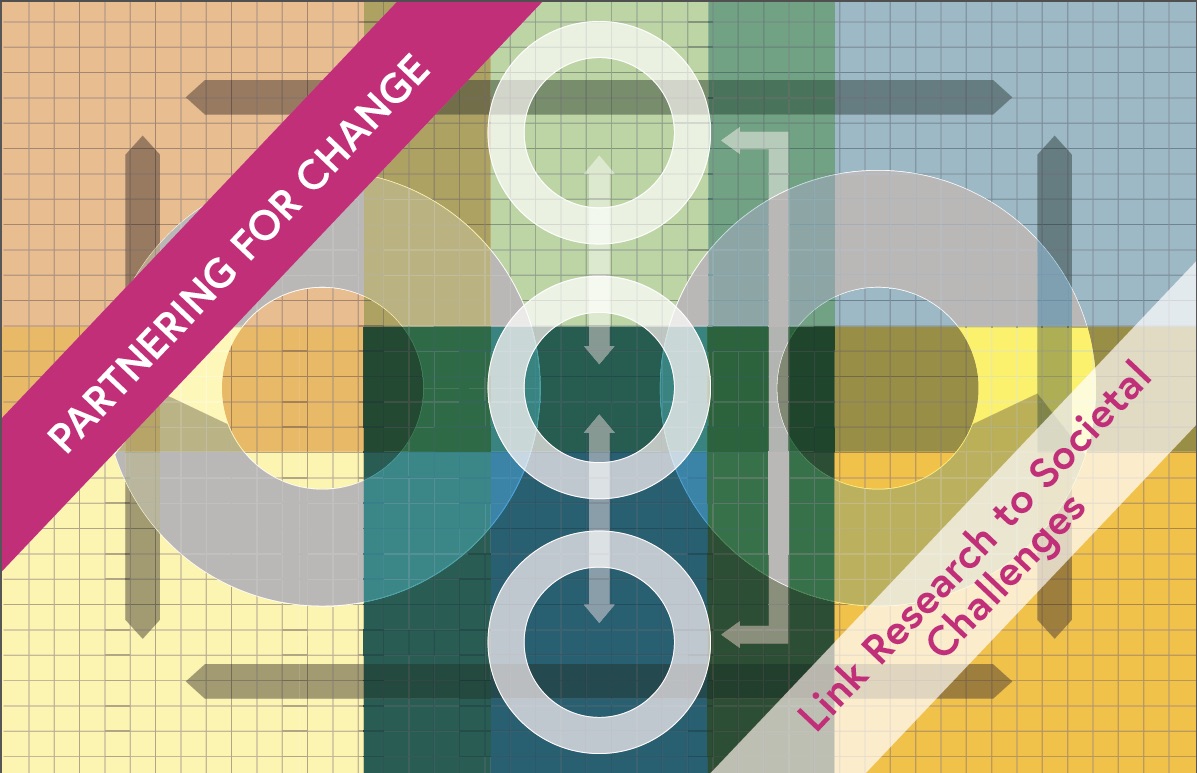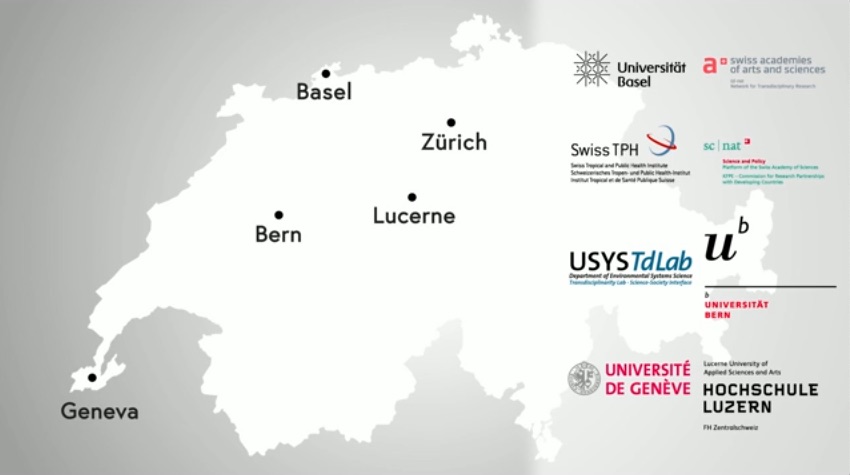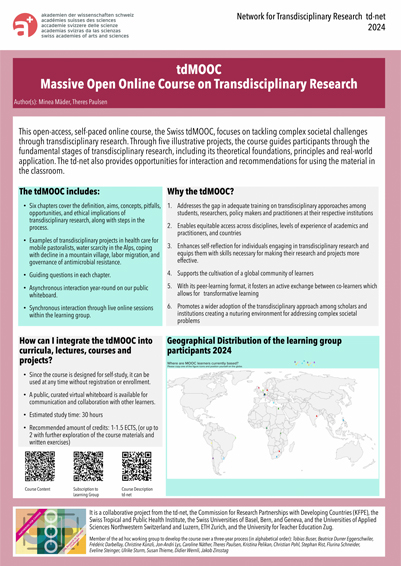Network for Transdisciplinary Research
Open Online Course on Transdisciplinary Research
The course can be used for self-study or teaching at any time and is fully accessible here. © td-net/swiss academies of arts and sciences
In addition td-net offers free, tutored learning-groups:
The Next implementation is planned for 2024
Registration mailing list: go.transdisciplinarity.ch/MOOCsubscribe
Don't want to miss anything? Subscribe to the mailing list today and become part of our exciting learning group.
The start of the learning group sessions is in the week of February 26, 2024.
Learning group sessions:
1) February 27, 2024: 15:00-17:00 CEST
2) March 12, 2024: 16:00-18:00 CEST
3) March 26, 2024: 17:00-19:00 CEST
4) April 09, 2024: 15:00-17:00 CEST
No time or money? No problem, participation in the learning group is voluntary and free of charge. We will also do our best to adapt the times to the participants' availability.
Any questions? In case of absence, questions and comments can always be left on our whiteboard (the link will be sent by email).
Download suggestions (PDF) on how to integrate the MOOC into curricula, lectures, courses and projects.
Contact:
Minea Mäder, collaborator of td-net
Email: td_mooc@scnat.ch
Swiss-made innovative co-produced massive open online course

About the course
In today’s world, we face many complex societal challenges. Projects addressing these challenges often involve actors and stakeholders from different fields and disciplines bringing together their own perspectives or knowledge on a topic. Accordingly, collaborative transdisciplinary approaches are crucial for the success of a project.
The course presents transdisciplinary research as a living experience. With a basis on sound theoretical and methodological background, five outstanding projects illustrate promising different ways of dealing with complex societal challenges. The projects address a) health care for mobile pastoralists, b) water scarcity in the Alps, c) coping with decline in a mountain village, d) labour migration, and e) governance of antimicrobial resistance.Starting from these challenges, the course will take learners on a journey through the main phases and steps of transdisciplinary research projects.
The course consists of six chapters totalling 30 hours’ workload for learners. Each chapter consists of a mix of formats, including videos, articles and discussions. All material is available year-round and can be integrated in lectures, courses, and self-studies.
Who is the course for?
Students and researchers from all backgrounds, policy makers and practitioners involved in searching solutions for complex societal challenges.
The course - as a whole or in parts - can nicely be integrated into seminars, courses, lectures, inversed classrooms and other formats. We are convinced, that students, researchers and practitioners from all backgrounds should have the opportunity to learn how to do research that helps to overcome societal challenges.
What topics will you cover?
- Research skills needed in order to produce relevant outcomes for society and academia
- Transdisciplinarity: principles, research processes, and application
- Guiding questions, phases, and steps in transdisciplinary projects
- Pitfalls and opportunities in transdisciplinary projects
- Ethical implications of co-production processes
- Examples of transdisciplinary projects on sustainable development, migration, and health topics
What will you achieve?
By the end of the course, you'll be able to...
- Develop your research skills as you investigate how to co-produce knowledge for society and academia.
- Reflect transdisciplinarity – its principles, its research processes and the context in which it is promising.
- Apply transdisciplinary approaches to societally relevant questions.
- Identify guiding questions, phases and steps of transdisciplinary project.
- Apply the principles and steps of transdisciplinary research to examples in order to reflect the implication for your own projects.
- Reflect the role of scientists and stakeholders in society and consider the ethical implications of co-producing processes.
ECTS Recommendations
Course duration: 6 Weeks
Estimated study time: 30 hours in total
Proposed ECTS: 1-1.5 points for following the course
The course offers many opportunities to explore the topics more in depth, e.g. additional publications, case documents, videos and links, or taking the discussion prompts as basis for written exercises. This may justify to increase ECTS to 1.5 – 2 points or higher.
To reduce study time, you may choose only two cases out of the five presented and follow only those.
ECTS points, including the respective tests have to be handled by the responsible lecturers according to their institutional regulations.
Conditions for obtaining a certificate
- Subscription to the learning group
- Synchronous: Participation and active involvement in at least one Live Zoom session
- Asynchronous: Active participation in the tdMOOC board: For asynchronous contributions, it is necessary that the contribution can be clearly assigned to a person. This can be done either by adding the first and last name on the sticky notes or anonymously with an abbreviation. However, if an anonymous abbreviation is used, this must be communicated by e-mail to td_mooc@scnat.ch.
- Asynchronous: a written answer to the questions in chapter 6.10. of 250-400 words.
Co-producing the course

A partnership brought together the Network for Transdisciplinary Research td-net, the Commission for Research Partnerships with Developing Countries, the Swiss Tropical and Public Health Institute, Swiss Universities of Basel, Bern and Geneva, Universities of Applied Sciences Northwestern Switzerland and Luzern, ETH Zurich, University for Teacher Education Zug, to produce this Massive Open Online Course. The concept and its content were designed through intense co-production processes by experts of the above-mentioned institutes.
The MOOC was also supported by Swiss Agency for Development and Cooperation (SDC).
More information:
The team behind the course
Course development - concept, theory, cases:
(listed in alphabetical order)
Tobias Buser, Network for Transdisciplinary Research td-net, Swiss Academies of Arts and Sciences (coordinator) - Now Global Alliance for Inter- and Transdisciplinarity ITD Alliance - contact
Dr Lisa Crump, Swiss Tropical and Public Health Institute, University of Basel
Prof. Dr Beatrice Durrer Eggerschwiler, Institute for Sociocultural Development, Lucerne University of Applied Sciences and Art
Prof. Dr Christine Künzli, School of Education, University of Applied Sciences Northwestern Switzerland
Dr Jon-Andri Lys, Commission for Research Partnerships with Developing Countries KFPE
Successor Dr Fabian Käser, Commission for Research Partnerships with Developing Countries KFPE
Caroline Näther, Institute for Sociocultural Development, Lucerne University of Applied Sciences and Art
Theres Paulsen, Network for Transdisciplinary Research td-net, Swiss Academies of Arts and Sciences (coordinator)
Prof. Dr Christian Pohl, USYS TdLab, ETH Zurich
Prof. Dr Stephan Rist, Centre for Development and Environment and Institute of Geography, University of Bern
PD Dr Flurina Schneider, Centre for Development and Environment, University of Bern
Eveline Steinger, Commission for Research Partnerships with Developing Countries KFPE
Prof. Dr Ulrike Sturm, Institute for Sociocultural Development, Lucerne University of Applied Sciences and Art
Prof. Dr Susan Thieme, Institute of Geography, University of Bern
Dr Didier Wernli, Global Studies Institute, University of Geneva
Prof. Dr Jakob Zinsstag, Swiss Tropical and Public Health Institute, University of Basel / Network for Transdisciplinary Research td-net, Swiss Academies of Arts and Sciences (initiator)
Educators:
Prof. Dr Jakob Zinsstag, Swiss Tropical and Public Health Institute, University of Basel / Network for Transdisciplinary Research td-net, Swiss Academies of Arts and Sciences
Tobias Buser, Network for Transdisciplinary Research td-net, Swiss Academies of Arts and Sciences, Now Global Alliance for Inter- and Transdisciplinarity ITD Alliance
Prof. Dr Frédéric Darbellay, Centre for Children’s Rights Studies, University of Geneva
Caroline Näther, Institute for Sociocultural Development, Lucerne University of Applied Sciences and Art
Prof. Dr Christian Pohl, USYS TdLab, ETH Zurich
Prof. Dr Stephan Rist, Centre for Development and Environment and Institute of Geography, University of Bern
PD Dr Flurina Schneider, Centre for Development and Environment, University of Bern
Prof. Dr Susan Thieme, Institute of Geography, University of Bern
Dr Didier Wernli, Global Studies Institute, University of Geneva
Guests:
Prof. Dr Gueladio Cissé, Swiss Tropical and Public Health Institute, University of Basel
Mohammed Ibrahim, Faculty of Veterinary Medicine, Jigjiga University (Ethiopia)
Dr Jon-Andri Lys, Commission for Research Partnerships with Developing Countries KFPE
Dr Kristina Pelikan, Swiss Tropical and Public Health Institute, University of Basel and KIT Karlsruhe (Germany)
Production and Implementation:
New Media Center, University of Basel
Dr Thomas Lehmann (director), Sebastian Schell, Dr Anna Altermatt, Olayemi Omodunbi, Chantal Ducommun, Christine Keller, Benedikt Willi, Cristoffel Gehring, Florian Siess, Christian Schläpfer, Klaus Vetter.
Additional video material provided by:
Swiss National Science Foundation SNSF
Dr Patricia Fry, Wissensmanagement Umwelt GmbH
In-kind and financial support:
Swiss Academies of Arts and Sciences
Network for Transdisciplinary Research td-net
Commission for Research Partnerships with Developing Countries KFPE Programme MINT Schweiz, Digitalisation
Swiss Agency for Development and Cooperation (SDC)
University of Basel
New Media Center
Swiss Tropical and Public Health Institute
University of Bern
Centre for Development and Environment
Institute of Geography
University of Geneva
Global Studies Institute
Centre for Children’s Rights Studies
Lucerne University of Applied Sciences and Art
Institute for Sociocultural Development
ETH Zürich
USYS TdLab
Newsletter td-info
td-net
House of Academies
Laupenstrasse 7
P.O. Box
3001 Bern
Switzerland
